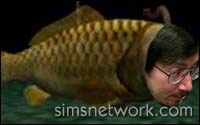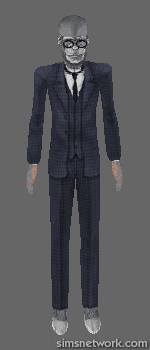The SimCity team and the website will be taking a short break during the holidays. Updates will continue January 8th. Happy Holidays from Maxis!
MySims News

EA Sports, It's in the game. Now it can be in your game. Download the new EA Sports Cheerleader Skin!
Yesterday we learned that SimsVille will never be. GameSpot sat down with Patrick Buechner and asked him some questions. Curious? Read the article on GameSpot! Or click read more to read it on our website.
Maxis talks to us about yesterday's sudden cancelation of its highly anticipated game SimsVille.
Yesterday's news of SimsVille's cancelation came as a surprise to Maxis' countless SimCity and The Sims fans. After all, SimsVille promised to combine gameplay elements from those two respective series of city-building and life-simulation games, which have proven so successful to the company in recent years. We received word of the sudden cancelation from a high-level and reliable source at Maxis, who chose to remain nameless in our news story, and while that person provided us with some important details about the decision to cancel the game, we still had many unanswered questions. What were the specific reasons for SimsVille's cancelation? Who made the final decision? What will become of the game's impressive 3D technology? For answers to those questions and more, we sat down with Maxis' director of marketing, Patrick Buechner, who was able to shed some light on yesterday's unfortunate news.
GameSpot: Patrick, was it Maxis or Electronic Arts that decided to cancel the game?
Patrick Buechner: The decision definitely came from within Maxis. It was a studio decision that involved the members of the SimsVille design team as well as a number of senior [executives]. At Maxis, we constantly evaluate all of our games during different stages of development, and during the constant review process for SimsVille, we decided that the game didn't live up to our standards.
GS: What exactly didn't live up to your standards? Can you tell us specifically which parts were lacking?
PB: For the past three years, we've had an extremely high standard for our games, and our customers have come to expect a certain consistent quality of gameplay from us. And while SimsVille had certain fun elements to it, the game had other parts that simply weren't as fun. For me, specifically, the first 10 minutes of building up my town was always enjoyable, but once I got past that part, the game became less compelling. Similar issues also influenced our decision.
GS: So would you say that SimsVille's design initially looked good on paper but was poorly executed within the game?
PB: No, I wouldn't say that. Our design process at Maxis is very different from that of other studios, and that's how we've been able to create such hit products recently. The secret to our success is what we call an iterative design process, wherein we constantly reevaluate a specific game's design as we develop it. For example, The Sims changed quite dramatically from when Will Wright originally envisioned it seven years ago as a game about architecture to what the final game is about today. SimsVille also changed a lot from when we first started working on it more than a year and a half ago, and the decision to cancel its development didn't have anything to do with [its original concept].
GS: Another reason cited for the cancelation was that The Sims: Hot Date will include some of the same features that SimsVille included. Does Maxis plan to include more SimsVille features in upcoming expansion packs for The Sims?
PB: Well, the whole reason we came up with the idea for SimsVille was the feedback from The Sims players, who were asking to see the lives of their Sims outside the house. They were sick of being stuck indoors, and while that aspect of The Sims is still fun, players wanted to know what goes on in their Sims' lives outside the house. The Sims: Hot Date lets players do everything they've been asking for, like hang out at the bar, have a picnic downtown, go shopping, and so on. After a while, we found that it was simply more fun than what we had in SimsVille.
GS: The official SimsVille Web site states that development of the game has been suspended. Does this mean that it hasn't been completely canceled? Is it possible that the game could be reworked to meet Maxis' standards and be released sometime in the future?
PB: No, SimsVille has been completely canceled. The game's idea is a good one, but it's not something we're currently thinking about reviving. We've got a lot of other projects we're working on, and we're focused on those right now.
GS: Did SimsVille's more mature content, such as adult theaters and armed robberies, have anything to do with the decision to cancel the project?
PB: No, certainly not. The Sims was a teen-rated game, and it had a lot of content that we consider to be cutting edge, so we're not afraid of dealing with mature content. Besides, the adult theaters and such in SimsVille simply represented the same kind of sense of humor that was found in The Sims. Ultimately, we were shooting for a teen rating for SimsVille, and if that content would have prevented us from getting such a rating, we would have simply removed it.
GS: Was EA or Maxis worried at all that SimsVille might compete with The Sims Online? Did that have any effect on the decision to cancel the game?
PB: No. SimsVille had a play experience that was unique from that of The Sims Online, and fans were excited about it. But the last thing we want is for our fans to be excited about one of our products, have them buy it, go home, and be disappointed with it. Honestly, we could have sold hundreds of thousands of copies of [SimsVille], but people wouldn't have had a great play experience with the game. It was a tough decision that we made--knowing that there's a lot of anticipation around a product, but having the will to say "This doesn't meet our standards."
GS: How close was SimsVille to completion when it was canceled?
PB: We were hoping to have the game done by March 2002, so I'd say we were about 60 percent complete.
GS: Will Maxis use some of the content and technology from SimsVille in its other upcoming games? Can you share any specific things from SimsVille that we'll see in new games? Will SimsVille's 3D engine be used in any new games?
PB: A 3D environment for some future Sims game is certainly something we want to do, but it won't be incorporated into anything that we've publicly announced, including The Sims Online.
GS: What projects are the people who were developing SimsVille working on now?
PB: They're all working on a variety of projects, including The Sims Online and several unannounced games.
GS: Is there anything you'd like to express to gamers who are disappointed with the cancelation of the game?
PB: I'd just like to reiterate that most of what the fans were looking for in SimsVille, we will be delivering in Hot Date. These people will really be satisfied with the town-building experience and other aspects of that expansion pack.
GS: How are Maxis' other projects coming along? When can we expect to see The Sims: Hot Date and The Sims Online in stores?
PB: We're all set for a November release date for The Sims: Hot Date, and The Sims Online is still on schedule for a late 2002 release.
GS: Thanks for your time, Patrick.
According to IGN, Maxis pulled the plug on SimsVille. Read more on IGN or click read more to read it on our website.
SimsVille Canned
Maxis and Electronic Arts pull the plug on SimsVille.
SimsVille, best described as a cross between The Sims and Sim City, has met an untimely end as it wasn't meeting Maxis' standards. Strange, considering when last we saw the game, it was actually shaping up fairly well. As a Maxis employee told us today,
"We have very high standards for our games, and SimsVille was meeting it in some places, but not in others."
Don't fret, little pet; it's not all grey clouds. Even though the title, which would have given users an intimate look at their denizens a la The Sims and a level of control a la Sim City, is gone, the knowledge used to create it will live on. The same Maxis representative told us,
"We're hoping to take what we've learned in SimsVille and using it in future projects."
Thankfully, it appears also that this move does not entail the layoffs of the title's development team (those are always the worst to report on), as it seems members of the SimsVille team have been moved onto other projects, and many are in fact now helping with the development of The Sims Online. No reason to let a lot of expertise and talent go to waste, eh?
-- IGN
According to IGN, Maxis pulled the plug on SimsVille. Read more on IGN or click read more to read it on our website.
SimsVille Canned
Maxis and Electronic Arts pull the plug on SimsVille.
SimsVille, best described as a cross between The Sims and Sim City, has met an untimely end as it wasn't meeting Maxis' standards. Strange, considering when last we saw the game, it was actually shaping up fairly well. As a Maxis employee told us today,
"We have very high standards for our games, and SimsVille was meeting it in some places, but not in others."
Don't fret, little pet; it's not all grey clouds. Even though the title, which would have given users an intimate look at their denizens a la The Sims and a level of control a la Sim City, is gone, the knowledge used to create it will live on. The same Maxis representative told us,
"We're hoping to take what we've learned in SimsVille and using it in future projects."
Thankfully, it appears also that this move does not entail the layoffs of the title's development team (those are always the worst to report on), as it seems members of the SimsVille team have been moved onto other projects, and many are in fact now helping with the development of The Sims Online. No reason to let a lot of expertise and talent go to waste, eh?
-- IGN
For all of you that missed the developer chat with Sid Meier, the transcripts are now available in the Chat area.
This Thursday legendary game designer Sid Meier will be in our chat room to discuss his new collaboration with Will Wright, SimGolf. The chat event starts at 3PM on Thursday July 26th. Make sure you get there early as space could be limited.
Happy Puppy interviews Will Wright!
Go to HappyPuppy.com, or click below to read part 2 of the interview!

Will Wright interview
by Avi Fryman and Libe Goad
In Part I of our interview with Will Wright, the Maxis co-founder and chief designer shared his insights on PC gaming, the evolution of artificial intelligence, why a SIMpsons game is unlikely, and more. Part II delves into stranger territory, as we discuss sadism, Simlish, online gaming, Hollywood, Seaman, Super Chiabot, and why helicopters are cool. Read on.
WW: Oh yeah. In fact, I know [Seaman designer] Yoot Saito very well. He's a very close personal friend. He did SimTower for us several years ago, and I got to know him and his family actually before that. So, yeah. Yoot's a character. [laughs] Sort of like a cowboy.
HP: [laughter] In preparing for this interview, we talked about games that we became really emotionally involved with, and Seaman is definitely one of them. When Seaman dies, you get really distraught.
WW: Yeah, Yoot's great because he's so twisted, you know? He's a writer, so in Seaman he did a very good job of finding a way to fully leverage his talents as a writer. Because he designed the whole kind of discussion that he takes you through, and it's just amazing how you all of a sudden start realizing, you know, that he's keeping track of all this stuff and he's about to use it against you. That's when you get really creeped out.
HP: Did you like the AI in Seaman? Did you think it was good AI?
WW: Well actually, he was very brute force. You know, technically it wasn't impressive, but design wise and execution wise, it was brilliant. And the emotional response I had to the thing was just amazing, you know, considering that it was this brute force approach. And it was really [via] Yoot's skill as a writer that he managed to kind of twist it around and make you feel that. Yeah, it was very remarkable in fact. Very creepy. After Seaman died…I had been raising him for about three weeks, and I thought I had set the clock back, because I had missed feeding him for like two days...but I had set the clock back wrong, and I was like, "oh shit." And I never booted it up again.
 HP: Speaking of AI, in the movie A.I., there's a sort of gladiatorial scene...
HP: Speaking of AI, in the movie A.I., there's a sort of gladiatorial scene...
WW: Oh, the middle part of the movie. Yeah, that was the part that I didn't like.
HP: But in a way, it's similar to Battle Bots. Can you tell us a bit about your involvement in that?
WW: Yeah, I've been doing that ever since the first Robot Wars, back in 1984. In fact, that's actually kind of what got me into computers originally, was robots. I mean, I've always built robots, kind of as a side hobby. And at some point I bought an Apple II to attach to my robots, so that's when I started playing around with computer programming, and eventually got into games. Yeah, I've actually been building robots on the side, you know, forever. But yeah, I've been a big winner the first few years, when the competition wasn't so tough, in one of the lightweight divisions the first year, and the middleweight the next year. My daughter and I do it together. I'm actually building a new one now. I've never usually taken the time. I usually throw something together about three weeks before the event. I'm actually building a decent one now, so I'm about halfway done with it.
HP: What were the names of your old ones?
WW: Well, I haven't had one in a couple of years. My daughter, I built one with her. Hers is [Super] Chiabot. It's this robotic shrub. [laughter] So, we've used that one for the last two events. Before that I had several, like six different robots for different years. The first one was Julie Bot. Kitty Puff Puff. Bob Smith was one, um, My Little Pony....
HP: Whereas a lot of people find themselves emotionally attached to their Sims, others treat them like pawns in a sadistic house of horrors. What's your take on pushing The Sims, which has a sort of cartoonish sheen to it, more towards the reality, hyper-realism arena?
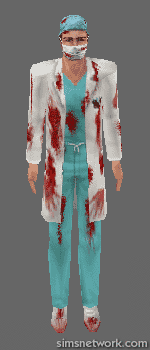 WW: Well, in some ways we've kind of settled on that level of representation and that kind of emotional tone. In fact, there were a couple of things that were more realistic that we took out. And we did a lot of tweaking related to it. For instance, if the Sims don't like each other, you can get them to slap each other. We've got two slaps in the game. We've got one that's kind of this bring your arm back, really wack them like you're breaking their jaw type of thing. And a lot of people, if they had a situation where they had a man and a woman living together, and they saw a situation like that, it really rubbed a lot of people the wrong way. It felt very domestic violence-like. So we changed the programming, so that if a man is slapping a woman, you get more of this kind of British army officer polite slap. Slap, slap, slap, slap, you know? It's kind of an insulting slap, rather than a sort of "I'm going to hurt you" slap.
WW: Well, in some ways we've kind of settled on that level of representation and that kind of emotional tone. In fact, there were a couple of things that were more realistic that we took out. And we did a lot of tweaking related to it. For instance, if the Sims don't like each other, you can get them to slap each other. We've got two slaps in the game. We've got one that's kind of this bring your arm back, really wack them like you're breaking their jaw type of thing. And a lot of people, if they had a situation where they had a man and a woman living together, and they saw a situation like that, it really rubbed a lot of people the wrong way. It felt very domestic violence-like. So we changed the programming, so that if a man is slapping a woman, you get more of this kind of British army officer polite slap. Slap, slap, slap, slap, you know? It's kind of an insulting slap, rather than a sort of "I'm going to hurt you" slap.
HP: Like a glove slap?
WW: Yeah, exactly. So, we changed it. If a man is hitting a woman, or a woman is slapping a man, you get that kind of um, insulting slap. But if it's a woman against a woman or a man versus a man, then they use the really strong arm slap. And that's just like one example. And oddly enough, that slap was offensive to more people or just kind of made people more uncomfortable than the attack, which is much more cartoonish. When they jump on each other, and there's this big cloud, and you see the arms and legs poking out. You know, that feels more like Road Runner. And nobody really had a problem with that. So, it was when we were going in the direction of more realism that it started really ticking off people. And we wanted it to be accessible to a fairly young audience.
Can Will speak Simlish? Will all Sims go to heaven?
HP: How much of you is in these games? Are there private jokes in there? How much Will Wright are we playing with?
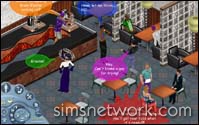 WW: Well, really, a lot of it is, of course, a big team effort. And I get a lot of the credit for these things, but in fact, you know, there are large teams of people that are all pouring their hearts and souls into these games. So in some sense, I become more like the marketing figurehead. I'm the one that they send out for the cameras, but really I represent all these people. And so…the whole team has put little bits and pieces of themselves throughout the entire game, in every little detail. We had one guy, he was a producer of The Sims, and it turned out that he was just a really excellent writer, especially when he's writing something in a sort of sarcastic tone. And so when we discovered this, we had him, he basically wrote all of the catalogue text in the game, which I thought turned out excellent. I don't know if you've read the catalogue descriptions, but you know, believe me, after you've written a kind of a catalogue advertisement for a chair…for 40 chairs, and after writing the 41st one, and still make it funny and interesting…that's art, you know? And that's just one guy. And if you go through and read all of the catalogue text, I mean, there's just a huge amount of himself that he's placed in this game. And the sound guys, that did all the voice recording, all the voice actors, they spent a lot of time and effort developing kind of Simlish, you know, in the voice-acting space. So, unless you kind of take the program apart, piece by piece, and look at all the different parts, it's hard to realize how many people put so much stuff into just one game like this.
WW: Well, really, a lot of it is, of course, a big team effort. And I get a lot of the credit for these things, but in fact, you know, there are large teams of people that are all pouring their hearts and souls into these games. So in some sense, I become more like the marketing figurehead. I'm the one that they send out for the cameras, but really I represent all these people. And so…the whole team has put little bits and pieces of themselves throughout the entire game, in every little detail. We had one guy, he was a producer of The Sims, and it turned out that he was just a really excellent writer, especially when he's writing something in a sort of sarcastic tone. And so when we discovered this, we had him, he basically wrote all of the catalogue text in the game, which I thought turned out excellent. I don't know if you've read the catalogue descriptions, but you know, believe me, after you've written a kind of a catalogue advertisement for a chair…for 40 chairs, and after writing the 41st one, and still make it funny and interesting…that's art, you know? And that's just one guy. And if you go through and read all of the catalogue text, I mean, there's just a huge amount of himself that he's placed in this game. And the sound guys, that did all the voice recording, all the voice actors, they spent a lot of time and effort developing kind of Simlish, you know, in the voice-acting space. So, unless you kind of take the program apart, piece by piece, and look at all the different parts, it's hard to realize how many people put so much stuff into just one game like this.
HP: Can you speak Simlish?
WW: Uh…sometimes. Not in the morning, though.
HP: [laughter] Getting back to the sadism theme for a second, are there going to be safeguards against sadistic behavior in The Sims Online?
WW: Yeah, in fact one of the biggest things in online games is grief players. And there are going to be a lot of things that are going to be fairly negative in The Sims Online that are appropriate for the gameplay. You know, it's appropriate to go up and slap somebody in certain instances. But if they don't like it, they have to have the ability to kind of filter you out or ignore you. So we have to have a lot of controls like that. Or if you create your own house or club or business in The Sims Online, if there are roving bands, gangs coming in, trying to disrupt what you're doing, you have to have the ability to kind of kick them out or keep them out of your house or business. So, a huge topic for us is moderating the kind of user-to-user grief play. That's a long topic too.
HP: Is there any concern about virtual streaking, for example?
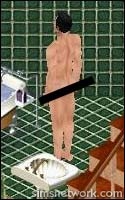 WW: Well, actually, we're not concerned about any one thing in particular. What we're concerned about is just anything that the other players might find offensive. And for different people, that's going to be different things. And so, we don't want to be in the position of saying well, you can do that but you can't do this. What we want to do is give the other players tools to then decide, this person is really bugging me. Even if they think they're playing the game perfectly, but you don't. Or maybe it's just the topics they tend to chat about. Or maybe it's they're cheating at the business. There are so many things, we cannot begin to imagine them all. And if we could, that would just be a sign that the game isn't very interesting. The fact that the game is so open-ended means that we shouldn't even try to imagine all the different ways that a player can bug another player. So, all we can really do is put in a lot of controls that are easily accessible, so if somebody really is bothering you in the game, you can filter them out.
WW: Well, actually, we're not concerned about any one thing in particular. What we're concerned about is just anything that the other players might find offensive. And for different people, that's going to be different things. And so, we don't want to be in the position of saying well, you can do that but you can't do this. What we want to do is give the other players tools to then decide, this person is really bugging me. Even if they think they're playing the game perfectly, but you don't. Or maybe it's just the topics they tend to chat about. Or maybe it's they're cheating at the business. There are so many things, we cannot begin to imagine them all. And if we could, that would just be a sign that the game isn't very interesting. The fact that the game is so open-ended means that we shouldn't even try to imagine all the different ways that a player can bug another player. So, all we can really do is put in a lot of controls that are easily accessible, so if somebody really is bothering you in the game, you can filter them out.
HP: Do you foresee any kind of player killing?
WW: The way we're doing killing in The Sims Online is weird. It's still very much in the kind of comic format. So, in fact, you can die in The Sims Online, and you turn into a ghost. And you can still do everything, except now you're a ghost. Until you leave that place and go back to your house. And then all of a sudden you're reconstituted as a real Sim. So, death doesn't really have any penalty like losing skill points or anything. But, in fact, we'll see people having sort of Halloween parties where the first thing you do when you come to the house is get killed, become a ghost, and then have a big ghost party, you know?
HP: Will being killed still be mostly on your own account, or will Sims be able to kill each other?
WW: Um, well, we're kind of working on that. There probably will be some way. But again, there's really not going to be any penalty, it's more like, "tag, you're it." So, we're assuming that people are going to use it more as, in social settings, kind of a fun thing. We're trying to do a lot of things with The Sims Online where the players can actually create their own games out of the parts and objects. So there might be some game kind of like freeze tag or something like that, where you get tagged and you turn into a ghost, and you stay that way until somebody unfreezes you.
Will futuristic computers make nice, dull friends?
HP: What's the most important thing you've learned about yourself in the process of game making?
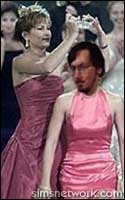 WW: Wow. That's a question. This sounds like one of those Ms. America questions. [laughter] Oh gosh, um, I guess not to take myself too seriously. And in fact, that has less to do with making games and more to do with working with a lot of large teams on difficult projects that go through emotional ups and downs. You definitely have to always step back and take what you're doing less seriously. Basically to manage stress, because making a game can actually be quite stressful. And I know a lot of people who have come and gone in the games business that lasted like four or five years, and the ones that have lasted 10 or 20 years are the ones that have kind of figured that out. You know, sometimes you have to just kick back and say, "OK, this is not the end of the world." You just need to be able to enjoy it.
WW: Wow. That's a question. This sounds like one of those Ms. America questions. [laughter] Oh gosh, um, I guess not to take myself too seriously. And in fact, that has less to do with making games and more to do with working with a lot of large teams on difficult projects that go through emotional ups and downs. You definitely have to always step back and take what you're doing less seriously. Basically to manage stress, because making a game can actually be quite stressful. And I know a lot of people who have come and gone in the games business that lasted like four or five years, and the ones that have lasted 10 or 20 years are the ones that have kind of figured that out. You know, sometimes you have to just kick back and say, "OK, this is not the end of the world." You just need to be able to enjoy it.
HP: What's the biggest hurdle you've had to overcome during your career?
WW: Oh gosh. Well, while getting Maxis off the ground we had a lot of hurdles like running out of money and stuff like that. Then there were creative hurdles. You know, getting The Sims out was a huge hurdle for me, and it was such a long, long process. A lot of people didn't really like the idea or see much potential in it. But it was just a matter of me fighting for the thing for year after year after year and finally getting it out the door. So that, to me, felt like as hard a project to do as I've ever done, for that very reason.
HP: What's the strangest request or general interaction you've ever had with a user?
WW: Oh, gosh. I have to think about that one for awhile. Of course, the standard is the "hire me, I want to design games" one. I get that all the time. A few people have wanted to be in the games. You know, "make me a Sim, I want to be in the game." A lot of requests from strange organizations and whatnot that want us to do a sim of this, that, or the other. I've gotten a huge number of those over the years. In fact, we were getting requests from the Department of Defense, the CIA, the Australian Tax Board, the Canadian Railways, I mean…
HP: And what did they want you to do exactly?
WW: They wanted us to do simulations for them, basically. You know, of the Canadian rail system, or intelligence gathering in Third World countries, or why Australians should pay their taxes. They were all convinced that we could do a simulation that would all of a sudden solve their problems. [laughs]
HP: What do you see yourself working on five years from now?
WW: Five years from now. Well, I'll definitely be working on robots. That's a given. On the software side, I think intelligent agents, to me has been a long-time attraction. It has for 20 years so far, 25 years probably. And I can see that I would still be working on some form of machine intelligence. I want to be able to just sit there and just have a conversation with my computer one day. Even if it's kind of boring, it could turn into one of my duller friends, you know. [laughter] I would just be fascinated by the thought process.
HP: Is there anything that you saw at E3 that blew you away, or at least impressed you substantially?
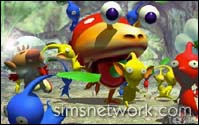 WW: I thought Pikmin was cool. I know a lot of people were kind of perplexed by it, but for me it felt like kind of a SimAnt type game. I liked the scale a lot. You know, the fact that it was zoomed in, really close. And I thought it was really neat, because it kind of went with the grain of the computer, or the hardware it was on. Rather than trying to make everything ultra-realistic and super-textured, they actually had the little characters as kind of Day Glo plastiform type things, you know? They had their own look, which made them stand out from the realistic textured backgrounds very nicely. But their motion really carried them. I thought it was, just artistically, a very beautiful thing to watch. Um, what else did I see? There were a couple of things I looked at that looked interesting. I'm a big fan of Alex Garden's. I loved Homeworld, so I was looking at Sigma, and that looked pretty cool.
WW: I thought Pikmin was cool. I know a lot of people were kind of perplexed by it, but for me it felt like kind of a SimAnt type game. I liked the scale a lot. You know, the fact that it was zoomed in, really close. And I thought it was really neat, because it kind of went with the grain of the computer, or the hardware it was on. Rather than trying to make everything ultra-realistic and super-textured, they actually had the little characters as kind of Day Glo plastiform type things, you know? They had their own look, which made them stand out from the realistic textured backgrounds very nicely. But their motion really carried them. I thought it was, just artistically, a very beautiful thing to watch. Um, what else did I see? There were a couple of things I looked at that looked interesting. I'm a big fan of Alex Garden's. I loved Homeworld, so I was looking at Sigma, and that looked pretty cool.
HP: Yeah, that's pretty out there.
WW: Yeah, and it had that same Homeworld-friendly feeling. You know, when I saw Homeworld at E3 many years ago, I remember seeing it and thinking, "God, there's no way that's going to be playable in 3D like that. It can't be done." But then I got a copy of it, and it was like a blast, I loved it, the interface was great, you know? I didn't really see anything like that this year. I checked out the Xbox stuff, and it looked really nice, but then you realize it's running on a 16:9 digital monitor, and then you look at it on NTSC, and it doesn't look all that great compared to anything else really.
HP: Plus, the gameplay is pretty much lacking at this point.
WW: Yeah, and I mean, the PlayStation2, they're finally getting a lot of stuff and some of it's starting to look pretty good. But nothing really struck me. I thought Star Wars Galaxies looked great. Nothing else comes to mind.
Sims: The Movie, anyone?
HP: Are there any other games you've played, aside from your own, that have influenced or inspired you?
WW: Oh yeah, all the time. I play a lot of games. Usually, I play like one first-person shooter a year, just to check in on those. I like Deus Ex. Enjoyed it. I actually enjoyed Clive Barker's Undying quite a bit. The sound design in that was awesome. I played Black & White. I thought the empathy with the creature and the facial expressions, and his body language was excellent.
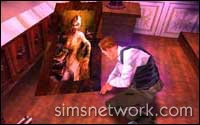 HP: Do you play console games?
HP: Do you play console games?
WW: Those I play with my daughter. So she's always dragging me to play those. We haven't bought a PlayStation 2 yet. I was going to buy one, but I haven't really seen a killer game that I've wanted. And after E3, I realized I need to get a GameCube. That's kind of obvious. Partially just because I want to play every game that Miyamoto makes. Of course, we played Zelda forever, and it's just a brilliant game. Harvest Moon is a cute little game on the Nintendo. I actually haven't played any PS2 games, I just watch people play 'em here at the office. We do have a Dreamcast that Yoot sent me so we could play Seaman, so we have a lot of Dreamcast games.
HP: How do you feel about the future of gaming as it now seems to be developing, and online gaming in particular?
WW: Well, it's definitely getting more mainstream. What's happening with all of the people who were playing Nintendo and Sony games as teenagers, is they're growing up and now buying computers, and still playing games. So, for these people, playing games is as natural as going to the movies or watching television. So I think there's this slow generational shift going on, where 10 years from now, most of the adults in America will spend a certain amount of their time playing games. And it'll be just perfectly normal. And it won't be considered so much this kid-like thing.
At the same time, there will be, I think, a better selection of games that will appeal to adults, and not just kids. That's the point at which gaming will have truly entered the mainstream. So I think you're going to start seeing games thematically broaden out a lot more from where they're at. You know, right now you go into a software store and most of the games are military, fantasy, sports, or the other big one. There's one more, fighting? Science fiction, that's it. Um, but you know, really you go into a bookstore and you see many more sections than just that. And in fact if you look at movies or TV or books, there's a large collection of them that are actually based around contemporary life, and they don't involve magic or fantasy or science fiction. They're about the issues that people face in day-to-day life. You get this in sitcoms or most movies really. And you see that in games hardly at all. You know, games have always been very extreme, at almost comic-book levels, about as far away from reality as you can get. But in fact, I think that some of the most interesting gaming experiences are going to be the ones that are focused around things that are much more relevant to your day-to-day life. And I think those are the things that are going to appeal to a much more mainstream audience in general.
HP: So Will, we want to know: when are you going Hollywood?
WW: Hollywood? Well, actually, I'm doing a little project on the side with some friends. We're working on a little kind of video project. And we're thinking about possibly television. But it's kind of an artificial intelligence tale set in feudal Japan, filled with puppets, kind of a la Nightmare Before Christmas. So it's something I'm kind of doing on the side to learn. It's not like I really want to go do the Hollywood thing. But it's more I'm interested in really fully understanding linear media. Especially as it's eventually going to relate to The Sims 2, because in that we want to get a much more kind of cinematic representation. You know, full 3D with interesting camera logic and stuff. So, in fact, there's a couple of robot video projects that I'm toying around with the idea of. We build robots, and go out and film them in the real world interacting with people and see how they relate to machines. I'm very interested in the way that people relate to mechanical intelligences and what they ascribe to them. So I think it would be the basis of some interesting video projects.
WW: Well, there's actually some work being done, not by me, but by some writers that we worked with on The Sims to do a Sims television show. And so that's actually kind of in the works.
HP: Is that a sure deal?
WW: No. It's at the point now where they're packaging it. Which in television terms means that they're putting together the scripts, the writers, putting together this kind of talent package that they can then take to a network and say, "OK, here's what it'll cost; here's what it'll be; here's who's working on it. Do you want to buy it now or not?" There are like two or three filters you go through in television. The first one is somebody gives you the OK to do a pilot, and you get a certain amount of funding to do that. And then you use the pilot to get through the next set of hoops. So, it's kind of a long, slow process. And television goes through these cycles, these biannual cycles, where there are a bunch of these things trying to jump through the hoop, and only ten percent of them will get through. And then the next hoop, only ten percent get through that hoop, and those that ultimately get a shot get on the air for a few weeks. It's a very Darwinian process.
What's a probot? Why are helicopters cool?
HP: True. On a separate note, what would you consider to be your most obscure project in the realm of gaming, and is it something that you would consider at this point in your career returning to, or is it best left unexplored?
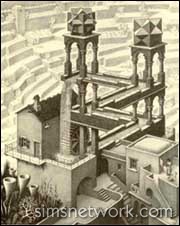 WW: I've only had two that I really worked on a significant amount and then didn't release them. Probably the first one would be the most obscure, and it was one that I worked on between Raid on Bungeling Bay and SimCity. And it was called Probots, you know kind of like "probe" and "robot." It was a very odd little abstract game. The graphics were actually quite nice. It was on the Commodore. In fact, I almost pretty much had the whole game running. But I never showed it to any publishers. I wish had a copy of it, because I lost all of my copies.
WW: I've only had two that I really worked on a significant amount and then didn't release them. Probably the first one would be the most obscure, and it was one that I worked on between Raid on Bungeling Bay and SimCity. And it was called Probots, you know kind of like "probe" and "robot." It was a very odd little abstract game. The graphics were actually quite nice. It was on the Commodore. In fact, I almost pretty much had the whole game running. But I never showed it to any publishers. I wish had a copy of it, because I lost all of my copies.
Basically, you had this little robot that you drove around with an arm on top of it. When you pushed the joystick, it would drive around in whatever direction. It was an isometric perspective, and there were all of these platforms that were connected by ramps kind of floating in space. But there were also these waterfalls that were interlacing through all of them, so it had a very Escher-like quality. It looked like an Escher kind of land, where you're driving this robot through this kind of three-dimensional maze. But there are these rivers that are interlaced with the entire maze. And in the rivers, are these little things floating by that you have to go pick up and collect. And there are three waterfalls that are coming out of these boxes that are floating in space. Out of one box are coming circles, out of one are cubes, and then the other one has pyramids. And they're floating down the streams and you've got to collect one of each and put them together and you get a point, and it kind of disappears. So you're basically building EA logos.
At the same time, there are these little three-legged aliens that are running around trying to do the same thing, but you can negotiate with the aliens. You could like wave your arm at them and make gestures. And they'd do gestures back, and they had this little gesturial language, and you could actually negotiate. And if you had two circles and the aliens had two cubes, you might trade one for each. Some of the aliens would cooperate with you, and some of them were competing with the others. It was a very bizarre game. But yeah, at some point I'd love to find a copy of that and resurrect it.
HP: That sounds pretty cool actually. Any last things you'd like to add, if we haven't squeezed the life out of you already?
WW: Last things I want to add…Um, helicopters are cool.
HP: Excellent. Thanks.
Happy Puppy interviews Will Wright!
Go to HappyPuppy.com, or click below to read part 1 of the interview!
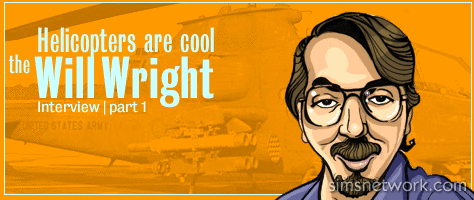
Will Wright interview
by Avi Fryman and Libe Goad
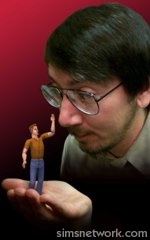 Will Wright, Maxis co-founder and chief designer, is for all purposes a gaming man of mystery. His SimCity and The Sims games have won numerous awards. He has been recognized on People's list of the most creative people in entertainment and by Time Digital as one of the most important people shaping technology. Yet, he still takes all of his own phone calls. There's no secretary shielding him from an adoring public, and if he's not there, you can simply leave a message on his voice mail, which, before this interview, gave us a first-hand look into the mind of Will Wright, the man.
Will Wright, Maxis co-founder and chief designer, is for all purposes a gaming man of mystery. His SimCity and The Sims games have won numerous awards. He has been recognized on People's list of the most creative people in entertainment and by Time Digital as one of the most important people shaping technology. Yet, he still takes all of his own phone calls. There's no secretary shielding him from an adoring public, and if he's not there, you can simply leave a message on his voice mail, which, before this interview, gave us a first-hand look into the mind of Will Wright, the man.
Ring, ring
"Hello? Is anyone there?" It's Will's voice.
"Uh, hi. This is Avi Fryman and Libe Goad from Happy Puppy…"
"Oh wait, I forgot. I'm not here," Will says.
We burst out in a nervous fit of laughter and continue introductions. On the other end, there's a strange silence.
"What kind of strange psychological game is this?" Avi thinks to himself.
"Dude," Libe pipes up. "I think that's his answering machine."
And so it was. Will calls us back, and before the interview begins, we already know he is a man who refuses to take himself too seriously. Following is the first half of our two-part interview with the self-dubbed "metaphorical cartographer."
Happy Puppy: When you introduced Miyamoto [at a press conference] at E3, you said that fun is "an ephimeral mist," and that "the more you try to grab at it, the more diffuse it is."
Will Wright: I said that? [laughs]
HP: You did. [laughter] And we consider you a pioneer of accessible gaming, so you obviously do have a grasp of it. How do you feel about that?
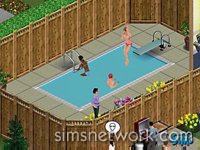 WW: Um, I don't really feel that I have a grasp of it, that's for sure. I feel more like I blunder into it occasionally. It's just one of those things that you kind of throw patience at, and I am a patient person. You've got to try out a lot of different things, consider the results, do play tests. You know, you kind of develop an instinct for it. And you kind of head towards something that you think is going to be fun, and then you make a lot of mid-course corrections all the time. You never quite get to where you want to be, I think, but you'll always kind of have a sense of which direction is uphill, towards more fun. So when I'm working on a game, I always feel like I'm pushing the game toward that direction. And sometimes it gets very steep, and it's hard to keep going, but then it gets easier in some spots. And occasionally you get to a flat area and you're not quite sure which direction to go in and that's kind of the scariest part of creating a game. You can kind of push it or tune it in any direction, and it's not really clear which is the best. But I'm not quite sure how abstract you want me to get with this. I can get pretty abstract sometimes. [laughs]
WW: Um, I don't really feel that I have a grasp of it, that's for sure. I feel more like I blunder into it occasionally. It's just one of those things that you kind of throw patience at, and I am a patient person. You've got to try out a lot of different things, consider the results, do play tests. You know, you kind of develop an instinct for it. And you kind of head towards something that you think is going to be fun, and then you make a lot of mid-course corrections all the time. You never quite get to where you want to be, I think, but you'll always kind of have a sense of which direction is uphill, towards more fun. So when I'm working on a game, I always feel like I'm pushing the game toward that direction. And sometimes it gets very steep, and it's hard to keep going, but then it gets easier in some spots. And occasionally you get to a flat area and you're not quite sure which direction to go in and that's kind of the scariest part of creating a game. You can kind of push it or tune it in any direction, and it's not really clear which is the best. But I'm not quite sure how abstract you want me to get with this. I can get pretty abstract sometimes. [laughs]
HP: When you say you're pushing a game in a direction, are you pushing it towards greater accessibility or towards more fun?
WW: Well, the two are closely related. You know, if I give you the control panel for a 747 and you don't even know where to start, it's not going to be fun. So there has to be a certain level of accessibility. You have to understand a certain amount of what you're doing. Not completely. As soon as you completely understand what you're doing, it becomes quite boring. So it's kind of this fine balance between the two, where you understand a lot of what you're doing and how things work, but there are a few key variables that you're playing with, trying to explore or optimize or learn. The skills you learn in the game need to fall within the context of most of it being accessible and understandable.
HP: The person who introduced you prior to your introduction of Mr. Miyamoto at E3 said that the two of you have known each other for some time and that you had collaborated in the past. Is this the case, or are you currently collaborating on something?
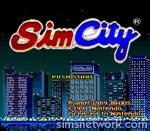 WW: In the past, when we first came out with SimCity, Miyamoto saw it, and was quite taken with it, and he wanted to have it on the Nintendo. This was back on the Super Nintendo, Super Famicom. And so they called us up and said that we want to do it, and they flew me out to Kyoto for a week, which I spent with him working on the redesign for that. Over the years we've kept in touch. Just about every time he's in town he gives me a call and we hang out.
WW: In the past, when we first came out with SimCity, Miyamoto saw it, and was quite taken with it, and he wanted to have it on the Nintendo. This was back on the Super Nintendo, Super Famicom. And so they called us up and said that we want to do it, and they flew me out to Kyoto for a week, which I spent with him working on the redesign for that. Over the years we've kept in touch. Just about every time he's in town he gives me a call and we hang out.
HP: Have there ever been any talks of you collaborating full-on with him on any new projects?
WW: Well, we're kind of in very different worlds, so not really. He's very tied to Nintendo and the cartridge side of things. We have talked about projects that we're working on over the years. I'm just kind of in awe of Miyamoto. He's like the guru on top of the mountain, you know?
What about Will and his PC?
 HP: Is your preference to work PC-specific, in general?
HP: Is your preference to work PC-specific, in general?
WW: Well, I guess I don't really think of it so much in those terms, but I want to work on the platform where I can be the most experimental. And that generally means some platform where there can be a lot of iteration and development and the costs aren't high. The cartridge market makes it harder to do experimental design because of the cost and development. And you're also dealing with unstable hardware, at the beginning, when things are first introduced, and they have kind of a very narrow market window. There's like one or two Christmases when these things really hit their peak before the next generation's coming out. So I think the PC for me feels like the more stable platform, over time. I can work on a game now that I know is not going to be ready for four years, and it's just a matter of me using more of the graphics power and CPU power. It's not a matter of everyone scrapping their PCs and buying a next generation PC which will render everything I've done useless. A lot of the projects I work on tend to be on fairly long time scales, relative to the majority of quality cartridge titles. Of course, Miyamoto is an exception. His projects tend to be relatively long time scale too. But of course, he's working on the hardware years before it's even released.
HP: What do you think about all the talk lately about whether or not PC gaming is going down?
WW: I think it's kind of an irrelevant argument. Whether the consoles start looking more like PCs or the PCs get more accessible like consoles, you know, I mean there's going to be some convergence between the two, but at least right now, for the foreseeable future, the PC is going to have a few advantages that I don't see the consoles coming anywhere near. Things like a high-res RBG monitor, mouse, and internet connectivity. There's a lot of things you can do on a PC that you're not going to conveniently do on a console. And vice versa too. So, no, I don't think the PC is dying.
HP: Where do you draw the majority of your inspiration from?
 WW: Mostly from reading. I read a lot. Mostly science, sociology, comics, history, but I would say primarily from reading science. I also like different design fields, like architecture and fine art design, industrial design.
WW: Mostly from reading. I read a lot. Mostly science, sociology, comics, history, but I would say primarily from reading science. I also like different design fields, like architecture and fine art design, industrial design.
HP: What have you been reading lately?
WW: Let's see. Right now I'm reading a book called, I think it's The Six Magic Numbers. It's about fundamental concepts of the universe, the way the universe works. I'm reading an architecture book, I forget the name of it. I'm reading a lot of astronomy books lately. I like reading physics and biology totally fascinates me. It's fascinated me for a long time.
HP: Did you study this stuff in college, or is it just a separate interest?
WW: Well, I've always been interested in a lot of different things, and that's kind of one of the reasons I think I ended up becoming a game designer. It's because I then have the excuse to study all of these subjects now, you know, whatever I want to. I can kind of pick what I want to learn and justify it as doing game research. I think about half the things I research I end up not making games out of. About half the games I make, I don't stop the research after I make the games. So I'm still reading books about city planning even though I'm kind of sick of SimCity. [laughs]
 HP: [laughter] In our research for this interview, we came across references to the Sim Mars project. What was that, and what happened to it?
HP: [laughter] In our research for this interview, we came across references to the Sim Mars project. What was that, and what happened to it?
WW: Well, it was really starting internally at Maxis. I wasn't really involved with it. At the time I was working on SimAnt. Some of the internal producers came up with this idea and we started working on it, thinking it would be interesting. It was supposed to be a fairly realistic simulation of the first exploration and then colonization of Mars. And so we had a lot of collaboration with NASA on it, using their actual conceptual drawings and plans for Mars. We had in fact originally planned to have the game released in time for the Pathfinder mission. No, it wasn't the Pathfinder. The next one, after that. The Mars Observer? Well, I forget what the other one was. But we thought it would be great if we had this game and it was released right in time for when this probe lands on Mars. Of course, that was one of the probes that failed miserably, so it's a good thing we didn't try to get the game out in time for the probe. But at some point, the people working on the game decided that it was kind of an interesting idea academically, but as a game it really wasn't going anywhere. And at that time also The Sims was really taking off, and so we took most of the team and then decided to ramp up most of our internal Sims projects.
Is space the place for The Sims? And will there be a SIMpsons game?
HP: Do you think The Sims will ever go to space?
WW: I wouldn't say it's unlikely. It's a possibility.
 HP: We're familiar with The Sims Online project that you're currently working on, which is really an expansion of the Sims' world. However, is there some macrocosmic way in which you plan to focus on a smaller element of the Sims' world, much in the way that SimCity was inspired by your experiences with level building in Raid on Bungeling Bay, and The Sims was then a macrocosmic expansion of SimCity? In other words, is there some element of The Sims that you feel you might focus on further, in a smaller sense?
HP: We're familiar with The Sims Online project that you're currently working on, which is really an expansion of the Sims' world. However, is there some macrocosmic way in which you plan to focus on a smaller element of the Sims' world, much in the way that SimCity was inspired by your experiences with level building in Raid on Bungeling Bay, and The Sims was then a macrocosmic expansion of SimCity? In other words, is there some element of The Sims that you feel you might focus on further, in a smaller sense?
WW: That's a very good question. You know, I don't think in that context, of The Sims' world, but in other contexts, yes. I'm playing around with some ideas now, a brand new project, and I'm not ready to talk about it, but it would involve something like that. As far as The Sims, we kind of pick the level we're dealing within. In some sense, The Sims 2 will be much closer in on the Sims. Much more in their face. They should seem much more detailed and real as you get much closer to them, so it'll have a little bit of that.
HP: We heard that you're not involved in the development of SimsVille. Why not?
WW: Well, you know, I've only got so much time.
HP: There's not like two or three of you? Some clones running around?
WW: Well, right now the Sims franchise is keeping me very busy. There's so many opportunities. There's so many things we could do with it, but it's dangerous to think in those terms, and trying to explore all the things we could do with it. We're at the point where usually these kinds of things spin out of control and get totally diluted. And what we really have to do at that point is focus on maybe two, or three at the most, things we're going to do with this franchise and we're going to do those well, as opposed to trying to do everything you can.
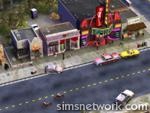 HP: What do you think about SimsVille?
HP: What do you think about SimsVille?
WW: I think it's very interesting. It's still going through a lot of design evolution. And in fact, I do talk to the designer every other day. Christine McGavran, she's the one who worked on Sim City 3000. I think the question with SimsVille is turning out to be what exactly is the focus of the game. How close is it to The Sims versus SimCity? And it's kind of between the two. And it kind of feels like it wants to be a little bit more one way or the other. But this is in very fine shadings of game tuning. The degree of latitude we're talking about here is actually quite minor. When it comes to tuning the game and getting inside of the player's head, it's actually a very crucial question.
HP: Do you know what makes the Sims games so addictive?
WW: I think for different people, it's different things. I know for me, and for a lot of people, it's the creativity. The fact that this a world that you can be fairly creative in. You know, either in terms of what you build or what you're designing, or in terms of what you play out. What type of story or situation that you kind of construct. But it's kind of creativity then meshed with this kind of serendipitous non-linear surprise aspect. So you've designed this thing, and you run it, and all of a sudden you see things that are plausible, but not what you expected. So you're kind of playing with chaos in a way. It's like this little chaos toy that you're playing with in your hand and occasionally it just turns purple. And you didn't expect it to turn purple. But then you think back on it and say, oh yeah, it makes sense that it turned purple.
 HP: As you said, there are only so many directions that you can take the franchise. But would you ever consider a joint-venture license, such as something that would incorporate The Simpsons? So that it would be the SIMpsons? That's the million-dollar idea of our assistant editor Gabe.
HP: As you said, there are only so many directions that you can take the franchise. But would you ever consider a joint-venture license, such as something that would incorporate The Simpsons? So that it would be the SIMpsons? That's the million-dollar idea of our assistant editor Gabe.
WW: That's come up a couple of times. This is kind of a larger business question. In general, with a company like us, we're much better off trying to develop our own intellectual property rather than trying to leverage off of someone else's intellectual property. Especially once we've gotten through the filters in distribution. So if we had a little game and it wasn't terribly remarkable, and we couldn't get distributors as excited about it, then the value of a Simpsons license would be tremendous. It could literally make or break our game. But on the other hand, if we have a game that's already going out there and doing great numbers, then internally it doesn't really make sense to be investing time and energy in something that's somebody else's intellectual property. We'd rather be spending that time building our intellectual property, which we can then leverage out against different formats. So that's kind of my boring, dry business answer.
HP: Someone could create a skin for The Simpsons anyway, I guess.
WW: Yeah, fans do that all the time, of course.
Are there loving AI bots in our future?
HP: Have you seen any user-created skins that you really thought were amazing?
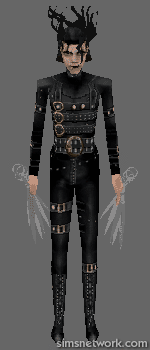 WW: All the time, yeah. There's a site called Dr. Frankensim. Some of the skins are amazing. But not only the skins...they're doing the full meshes and everything. So they do things like Edward Scissorhands. And it's just perfect in every detail. Even when he takes his clothes off, you can see where his body parts are sewn together. I mean, they're just amazing. The artists who lavish time on these things. And then other people are making these really cool stories that are up on our website. You know, we have this Sims Exchange thing. And it's just amazing how much people lavish on these stories. There's one where this woman's husband is a mad scientist and he makes this weird device, and then one day he's away and she goes into his lab to play with the device. And all of a sudden she gets popped into the real world. And they actually recreated the whole family and the house and everything, like in 3D Max or something. And so there's a whole 3D version of this character walking around the same house. And then she goes and turns on the computer and she sees him in the sim world again, crying because he can't find her. And then she feels bad, and she finds a way to go back to the vortex and back to the sim world. And it's just amazing that somebody took the time to do this.
WW: All the time, yeah. There's a site called Dr. Frankensim. Some of the skins are amazing. But not only the skins...they're doing the full meshes and everything. So they do things like Edward Scissorhands. And it's just perfect in every detail. Even when he takes his clothes off, you can see where his body parts are sewn together. I mean, they're just amazing. The artists who lavish time on these things. And then other people are making these really cool stories that are up on our website. You know, we have this Sims Exchange thing. And it's just amazing how much people lavish on these stories. There's one where this woman's husband is a mad scientist and he makes this weird device, and then one day he's away and she goes into his lab to play with the device. And all of a sudden she gets popped into the real world. And they actually recreated the whole family and the house and everything, like in 3D Max or something. And so there's a whole 3D version of this character walking around the same house. And then she goes and turns on the computer and she sees him in the sim world again, crying because he can't find her. And then she feels bad, and she finds a way to go back to the vortex and back to the sim world. And it's just amazing that somebody took the time to do this.
HP: What is your take on the evolution of artificial intelligence? And have you seen A.I.?
WW: Yeah, I did. I liked it a lot. Although the AI part didn't seem terribly reasonable to me. But I really enjoyed the movie, except for the middle part. I think they could have cut out the entire middle part and it would have been a better movie.
HP: Well, do you see artificial intelligence taking on more and more human characteristics over the course of time, or do you see it moving in another direction?
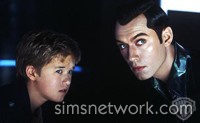 WW: I see it moving in another direction. I mean, I think artificial intelligence will have the ability to mimic human behavior, but that's not going to be its natural thought process. I think that eventually, and this might be 50 years down the road, maybe 100, where we get human-level mechanical intelligence. I don't think it's going to think like us at all. I think there's a very large space of possible minds and the chances are that whatever minds we eventually evolve in a computer will be dramatically different, both in form and function, from ours. We tend to have this circuit in our brain that wants to map our empathy onto inanimate objects. So you know, we tend to want to ascribe human intents and desires, and emotions to intelligent machines. But in fact, I don't think they're going to have the same motivations or emotions or intents as we do. They're going to be absolutely inscrutable. They're going to be very alien. I think the first aliens we meet, in fact, are going to be the ones we invent.
WW: I see it moving in another direction. I mean, I think artificial intelligence will have the ability to mimic human behavior, but that's not going to be its natural thought process. I think that eventually, and this might be 50 years down the road, maybe 100, where we get human-level mechanical intelligence. I don't think it's going to think like us at all. I think there's a very large space of possible minds and the chances are that whatever minds we eventually evolve in a computer will be dramatically different, both in form and function, from ours. We tend to have this circuit in our brain that wants to map our empathy onto inanimate objects. So you know, we tend to want to ascribe human intents and desires, and emotions to intelligent machines. But in fact, I don't think they're going to have the same motivations or emotions or intents as we do. They're going to be absolutely inscrutable. They're going to be very alien. I think the first aliens we meet, in fact, are going to be the ones we invent.
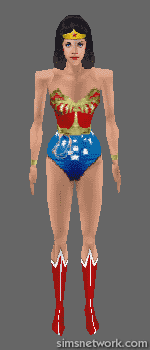 HP: Right now the Sims are sort of pared down so that the user can insert part of themselves into the Sims experience. Do you think that at any point you'll try to give your Sims more human characteristics?
HP: Right now the Sims are sort of pared down so that the user can insert part of themselves into the Sims experience. Do you think that at any point you'll try to give your Sims more human characteristics?
WW: Well, there are two aspects to this. There is building something that is artificially intelligent. You know, sitting there and making a lot of interesting behavioral decisions and actually getting by in its environment. And then there is the trick of getting people to think that what they see is an intelligent agent, acting like a human. They're actually very different things. One of them is kind of like magic, where I'm pulling the wool over your eyes and saying, "Look at all of these little people. They're real." The other one is actually trying to create something that in fact has a pretty large behavioral space. In fact, I find both of those activities very fascinating. And I look forward to pursuing both of those in the future, both trying to create intelligent mechanical intelligences, and figuring out how to get people to empathize with these artifacts on the screen. But I feel like they're very different things. But they come together in The Sims, you know, we're kind of doing both. They do have a fair amount of intelligent behavior that they have to exhibit. At the same time, we also want you to think that they're actually feeling sad or happy or mad, and having these emotions that they don't really have. So yeah, I see myself pursuing that.
To read the Press Release from EA, click the link!
EA Announces Plans For The Sims Hot Date Expansion Pack
Third Add-on Disk to 2000 and 2001's Top-Selling PC Game in Stores this Fall
REDWOOD CITY, Calif., July 5, 2001 - Electronic Arts (Nasdaq: ERTS) today announced plans to release this Fall The Sims™ Hot Date Expansion Pack, a new add-on disk to the top-selling PC game of 2000 & 2001, The Sims™. The Sims Hot Date Expansion Pack represents an entirely new experience for The Sims-dating! With exciting new characters, interests, romance objects, and an all-new Downtown area filled with restaurants, shops and parks, The Sims Hot Date will get your Sims off the couch and into the singles scene. Play matchmaker for your Sims and watch them become Casanovas or Casanevers.
"Just like everyone, the Sims are looking for love," said Tim LeTourneau, Producer at EA's Maxis™ studio. "Hot Date allows Sims to experience the hilarious ups and downs of the dating game."
Players can have their Sims ask each other out on a date or try their luck with an in-game dating service. Arrange to meet another Sim Downtown at exciting and romantic locations that the player can create. Everything from a candlelit dinner, a drink at the bar or a rendezvous in the park is possible as your Sim attempts to orchestrate an evening to remember.
Once your Sim is out with that special someone, additional interests and new interactions keep the conversation flowing and chemistry clicking. Sims can now flirt, play footsie, engage in a little tonsil hockey, or converse in Simlish about new and diverse interests. Being a fun and fascinating date gets your Sim one step closer to a goodnight kiss or more!
Players can watch sparks fly or fizzle as their Sims meet and date a host of new characters. Sims can spurn the advances of The Jock, welcome the overtures of the Femme Fatale, find true lust with Mr. Medallion, or strike out with the Blonde Bombshell. Over 100 new objects, including the Picnic Basket, Cuddle Couch and the Love Tub, allow players to set the mood for their Sims. Find your Sim a soul mate…or have fun trying with The Sims Hot Date.
The Sims' unparalleled success has already inspired the creation of two add-on packs, The Sims Livin' Large which shipped in September 2000 and The Sims House Party which shipped April 2001. The Sims Livin' Large allows players to put their simulated families from The Sims into new extreme situations and settings and The Sims House Party gives players the chance to host outrageous parties for their Sims. Combined sales for both titles in North American top one million units.
The Sims, the wildly popular game that allows players to create a neighborhood of simulated people known as "Sims" and control their lives, skyrocketed to the top of the charts when it began shipping to stores in February 2000 and has quickly become a universal gaming and cultural phenomenon. It was the best selling PC game of 2000 and 2001 according to Reston-based PC Data. Translated into 13 different languages, the game has sold over 4 million units worldwide. For more information on The Sims, The Sims Livin' Large, The Sims House Party, and The Sims Hot Date visit http://www.ea.com.
Electronic Arts, headquartered in Redwood City, California, is the world's leading interactive entertainment software company. Founded in 1982, Electronic Arts posted revenues of more than $1.4 billion for fiscal 2001. The company develops, publishes and distributes software worldwide for personal computers and video game systems. Electronic Arts markets its products under four brand names: EA SPORTS™, EA GAMES™, EA SPORTS BIG™ and EA.COMSM. More information about EA's products and full text of press releases can be found on the Internet at http://www.ea.com.














